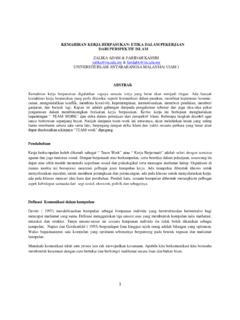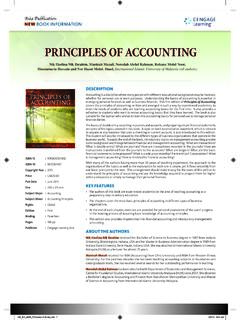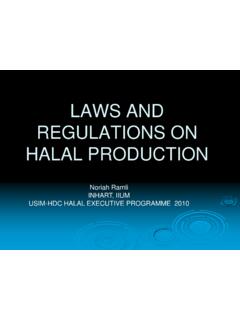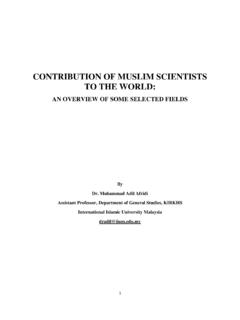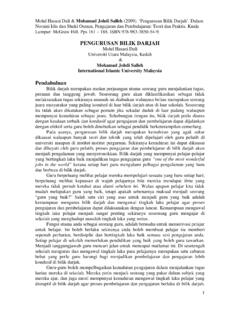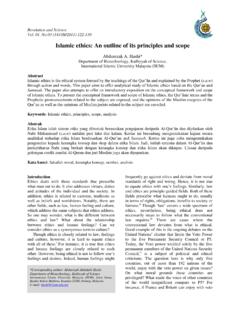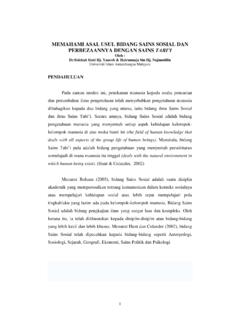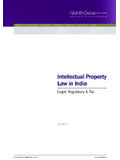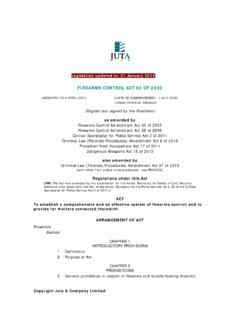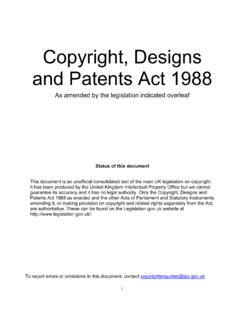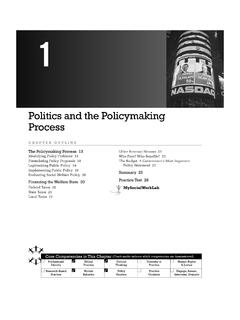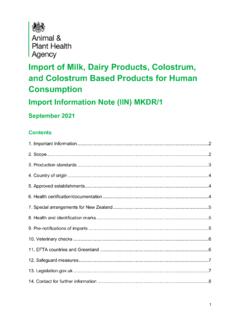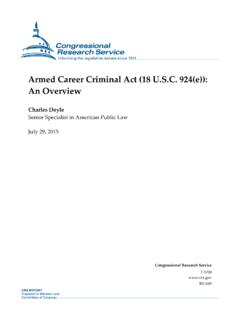Transcription of VIOLATION OF CYBERLAWS AND COMPUTER ETHICS: THE ...
1 VIOLATION OF CYBERLAWS AND COMPUTER ETHICS: THE CONSEQUENCES AND POTENTIAL LEGAL ACTIONS Juriah Abdul Jalil & Duryana Mohamed Department Of Private Law, Ahmad Ibrahim Kuliyyah Of Laws International Islamic University Malaysia. Malaysia & Abstract Good ethics and professionalism when using COMPUTER or Internet should be strictly observed and exercised. Failure to do so will result in VIOLATION of the laws and COMPUTER ethics. Consequently, not only the victim will suffer loss but also the country as a whole. It is known that, the borderless nature of the cyber world has encouraged many people to try and explore various types of cyber activities but that is not a passport for everybody to cross the border and ignored the laws and regulations. Although there are cyber laws to control and regulate these cyber activities cases of cyber attacks and invasion to privacy and safety are still rampant.
2 Thus, this paper seeks to study the available laws governing COMPUTER users, cases that involve VIOLATION of cyber laws and COMPUTER ethics, the effect of VIOLATION of those laws on the victim and finally, the potential legal actions available tothe victim of cyber attacks according to the categories of the offences. References will be taken from various discussion on cyber and COMPUTER ethics as well as cases on cyber offences. In conclusion, the authors hope that this paper would be able to assist the victims to stand up for their rights by seeking the available remedies besides providing resources to lawyers and court officers in dealing with cases on cyber attacks, particularly in Malaysia. Introduction Cyber world is known for its unlimited space and boundaries. Thus, anyone can upload anything into the unlimited space from anywhere in the world.
3 Consequently, cyber world become an ocean of information that enables people to share, communicate, make business, making friends including creating opportunities to commit crimes and taking advantage of people openness in sharing data and information about themselves by those predators looking for victims in the cyber world. Regulating behaviour is never easy despite the existence of laws and regulations and one of the most difficult challenges is that technology are often too fast developed for the law to catch up. Nevertheless, observing COMPUTER ethics and respecting privacy of other people should be imposed and be made aware to all online users. However, most importantly to the victims is the availability of a legal redress to compensate the loss suffered as a result of abuse and VIOLATION of the laws by the criminals.
4 This paper will highlight the available laws that govern the COMPUTER users and cyber activities. Several selected cases on VIOLATION of the cyber laws and COMPUTER ethics will then be analysed. The effect of VIOLATION of those laws on the victim and their rights to sue for damages and other remedies will be presented at the later part of this paper. The aims are to provide information to the victim of cyber attacks and to provide further references to lawyers and court officers in dealing with cases on cyber attacks, particularly in Malaysia. CYBERLAWS AND COMPUTER ETHICS Law in general terms means to regulate and govern in order to create a safe environment. Thus CYBERLAWS are set of laws that govern or regulate the cyber activities. In relation to formation and enactment of cyber laws in Malaysia, Tun Mahathir Mohamed who was the former Prime Minister of Malaysia, explained that the reason for enacting various cyber laws were intended to prevent destructive abuses.
5 This is an important step in order to promote and create a positive and progressive development of cyber activities in Malaysia that will benefit both the country and citizen at all age. The term, ethics refers to the rules and standards governing the rightful or wrongful behaviour of an individual and it defines what is good for the individual and for society and establishes the nature of duties that people owe themselves and one another. In relation to cyber world, a new type of ethics known as COMPUTER ethics has emerged resulting in the creation of Code of COMPUTER Ethics that may have binding effect on the professionals particularly if the code becomes part of the work ethic and procedure. Failure to comply with the Code may lead to VIOLATION of the laws or breach of employment contract. In order to govern the COMPUTER ethics, the COMPUTER Ethics Institute of the United State has created the Ten Commandments of COMPUTER Ethics in 1992 that read as follows: 1.
6 You shall not use a COMPUTER to harm other people 2. You shall not interfere with other people s COMPUTER work 3. You shall not snoop around in other people s COMPUTER files 4. You shall not use a COMPUTER to steal 5. You shall not use a COMPUTER to bear false witness 6. You shall not copy or use proprietary software for which you have not paid 7. You shall not use other people s COMPUTER resources without authorization or proper compensation. 8. You shall not appropriate other people s intellectual output. 9. You shall think about the social consequences of the program you are writing or the system you are designing. 10. You shall always use a COMPUTER in ways that ensure consideration and respect for your fellow human. Other than the Association for Computing Machinery (ACM), the British COMPUTER Society has also published a code of conduct and code of practice for COMPUTER professionals in the UK.
7 In Malaysia, a code known as Content Code has been created. The content Code sets out the guidelines and procedures for good practice and standards of content disseminated to audiences by service providers in the communications and multimedia industry in Malaysia. The Code seeks to identify what is regarded as offensive and objectionable while spells out the obligations of content providers within the context of social values in this country. This code put the responsibility of the contents of the internet on the creator of content. VIOLATION Of the laws and COMPUTER Ethics VIOLATION of laws may include VIOLATION of COMPUTER ethics but VIOLATION of COMPUTER ethics may not be necessarily amount to VIOLATION of the laws in some countries. This is due to different concepts of ethics adopted by the countries. Nevertheless ethical values and legal principles are usually closely related.
8 In some cases the law mandates ethical values particularly in employment sphere and in supporting self regulation in case of media and telecommunication industry, by setting up the code of ethics. Based on the Ten Commandments of COMPUTER Ethic, the law actually codify these ethics in the manner of protecting the reputation, privacy, information and data, copyright and other fundamental rights and liberties of other human being in the cyber world. Most of these laws are now being extended to apply to online matters. In the absence of relevant law to govern certain online matters, cyber laws have been enacted which also provides punishment for VIOLATION or breach of any rights of a Malaysia, there are several laws governing cyber activities and the laws were enacted by the government since 1997. The CYBERLAWS and its Scope The CYBERLAWS were enacted with the objectives of governing the cyber activities and to control any cyber attacks.
9 The laws also provide specific punishment for the cybercriminals. However, not all laws provide adequate protection to the COMPUTER users. The followings are the laws and their objective: a) COMPUTER Crimes Act 1997: The aim of this Act is to govern offences relating to misuse of computers, including through networking and electronic mail. There are 12 sections in the Act. This Act provides criminal sanctions or punishment. b) Copyright (Amendment) Act 1997: This Act aims to protect against the unauthorised transmission of copyright work on the Internet and to deal with issues on software piracy, infringement of online trademarks, domain names dispute and new invention of patents. Other relevant Acts include trade marks Act 1976, the Patent Act 1983, the Industrial Design Act 1996, the Layout Designs of Integrated Circuits Act 2000 and the Optical Discs Act 2000.
10 Most of these Acts mentioned here provides for civil remedies for infringement of the owner s right. The Optical disc Act nevertheless provides for criminal punishment. c) Communication and Multimedia Act 1998: This Act has been enacted to govern and guide the development of this multimedia industry. The Act is based on the principles of transparency and clarity, flexibility, competition and industry self-regulation. There are also many rules, regulations and exemption orders governing the industry in Malaysia, which have been created due to innovations and inventions in the communication and broadcasting industries. There are several sections governing cyber related cases namely sections 112 and 233. d) Digital Signature Act 1997: The Act aims to provide security protection to online transactions. It regulates the use of digital signatures and governs certification authorities through issuance of valid licences.
